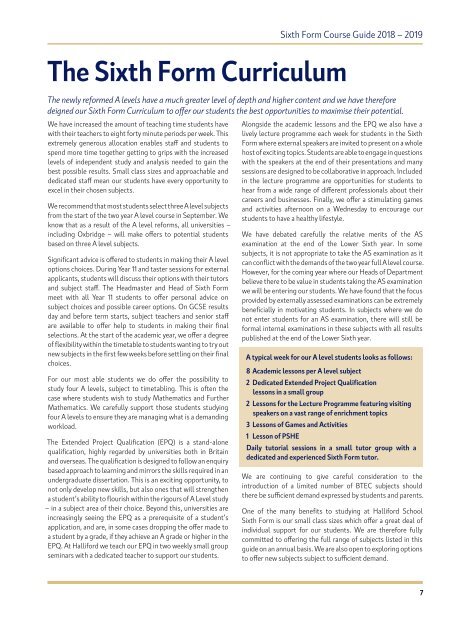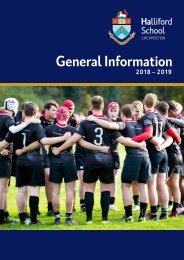SixthFormCourseGuide_1.8
You also want an ePaper? Increase the reach of your titles
YUMPU automatically turns print PDFs into web optimized ePapers that Google loves.
Sixth Form Course Guide 2018 – 2019<br />
The Sixth Form Curriculum<br />
The newly reformed A levels have a much greater level of depth and higher content and we have therefore<br />
deigned our Sixth Form Curriculum to offer our students the best opportunities to maximise their potential.<br />
We have increased the amount of teaching time students have<br />
with their teachers to eight forty minute periods per week. This<br />
extremely generous allocation enables staff and students to<br />
spend more time together getting to grips with the increased<br />
levels of independent study and analysis needed to gain the<br />
best possible results. Small class sizes and approachable and<br />
dedicated staff mean our students have every opportunity to<br />
excel in their chosen subjects.<br />
We recommend that most students select three A level subjects<br />
from the start of the two year A level course in September. We<br />
know that as a result of the A level reforms, all universities –<br />
including Oxbridge – will make offers to potential students<br />
based on three A level subjects.<br />
Significant advice is offered to students in making their A level<br />
options choices. During Year 11 and taster sessions for external<br />
applicants, students will discuss their options with their tutors<br />
and subject staff. The Headmaster and Head of Sixth Form<br />
meet with all Year 11 students to offer personal advice on<br />
subject choices and possible career options. On GCSE results<br />
day and before term starts, subject teachers and senior staff<br />
are available to offer help to students in making their final<br />
selections. At the start of the academic year, we offer a degree<br />
of flexibility within the timetable to students wanting to try out<br />
new subjects in the first few weeks before settling on their final<br />
choices.<br />
For our most able students we do offer the possibility to<br />
study four A levels, subject to timetabling. This is often the<br />
case where students wish to study Mathematics and Further<br />
Mathematics. We carefully support those students studying<br />
four A levels to ensure they are managing what is a demanding<br />
workload.<br />
The Extended Project Qualification (EPQ) is a stand-alone<br />
qualification, highly regarded by universities both in Britain<br />
and overseas. The qualification is designed to follow an enquiry<br />
based approach to learning and mirrors the skills required in an<br />
undergraduate dissertation. This is an exciting opportunity, to<br />
not only develop new skills, but also ones that will strengthen<br />
a student’s ability to flourish within the rigours of A Level study<br />
– in a subject area of their choice. Beyond this, universities are<br />
increasingly seeing the EPQ as a prerequisite of a student’s<br />
application, and are, in some cases dropping the offer made to<br />
a student by a grade, if they achieve an A grade or higher in the<br />
EPQ. At Halliford we teach our EPQ in two weekly small group<br />
seminars with a dedicated teacher to support our students.<br />
Alongside the academic lessons and the EPQ we also have a<br />
lively lecture programme each week for students in the Sixth<br />
Form where external speakers are invited to present on a whole<br />
host of exciting topics. Students are able to engage in questions<br />
with the speakers at the end of their presentations and many<br />
sessions are designed to be collaborative in approach. Included<br />
in the lecture programme are opportunities for students to<br />
hear from a wide range of different professionals about their<br />
careers and businesses. Finally, we offer a stimulating games<br />
and activities afternoon on a Wednesday to encourage our<br />
students to have a healthy lifestyle.<br />
We have debated carefully the relative merits of the AS<br />
examination at the end of the Lower Sixth year. In some<br />
subjects, it is not appropriate to take the AS examination as it<br />
can conflict with the demands of the two year full A level course.<br />
However, for the coming year where our Heads of Department<br />
believe there to be value in students taking the AS examination<br />
we will be entering our students. We have found that the focus<br />
provided by externally assessed examinations can be extremely<br />
beneficially in motivating students. In subjects where we do<br />
not enter students for an AS examination, there will still be<br />
formal internal examinations in these subjects with all results<br />
published at the end of the Lower Sixth year.<br />
A typical week for our A level students looks as follows:<br />
8 Academic lessons per A level subject<br />
2 Dedicated Extended Project Qualification<br />
lessons in a small group<br />
2 Lessons for the Lecture Programme featuring visiting<br />
speakers on a vast range of enrichment topics<br />
3 Lessons of Games and Activities<br />
1 Lesson of PSHE<br />
Daily tutorial sessions in a small tutor group with a<br />
dedicated and experienced Sixth Form tutor.<br />
We are continuing to give careful consideration to the<br />
introduction of a limited number of BTEC subjects should<br />
there be sufficient demand expressed by students and parents.<br />
One of the many benefits to studying at Halliford School<br />
Sixth Form is our small class sizes which offer a great deal of<br />
individual support for our students. We are therefore fully<br />
committed to offering the full range of subjects listed in this<br />
guide on an annual basis. We are also open to exploring options<br />
to offer new subjects subject to sufficient demand.<br />
7




